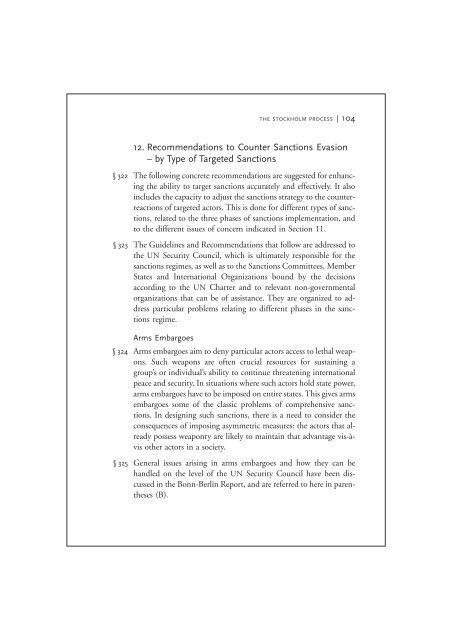Making Targeted Sanctions Effective - Small Arms Survey
Making Targeted Sanctions Effective - Small Arms Survey
Making Targeted Sanctions Effective - Small Arms Survey
You also want an ePaper? Increase the reach of your titles
YUMPU automatically turns print PDFs into web optimized ePapers that Google loves.
THE STOCKHOLM PROCESS | 104<br />
12. Recommendations to Counter <strong>Sanctions</strong> Evasion<br />
– by Type of <strong>Targeted</strong> <strong>Sanctions</strong><br />
§ 322<br />
§ 323<br />
§ 324<br />
§ 325<br />
The following concrete recommendations are suggested for enhancing<br />
the ability to target sanctions accurately and effectively. It also<br />
includes the capacity to adjust the sanctions strategy to the counterreactions<br />
of targeted actors. This is done for different types of sanctions,<br />
related to the three phases of sanctions implementation, and<br />
to the different issues of concern indicated in Section 11.<br />
The Guidelines and Recommendations that follow are addressed to<br />
the UN Security Council, which is ultimately responsible for the<br />
sanctions regimes, as well as to the <strong>Sanctions</strong> Committees, Member<br />
States and International Organizations bound by the decisions<br />
according to the UN Charter and to relevant non-governmental<br />
organizations that can be of assistance. They are organized to address<br />
particular problems relating to different phases in the sanctions<br />
regime.<br />
<strong>Arms</strong> Embargoes<br />
<strong>Arms</strong> embargoes aim to deny particular actors access to lethal weapons.<br />
Such weapons are often crucial resources for sustaining a<br />
group’s or individual’s ability to continue threatening international<br />
peace and security. In situations where such actors hold state power,<br />
arms embargoes have to be imposed on entire states. This gives arms<br />
embargoes some of the classic problems of comprehensive sanctions.<br />
In designing such sanctions, there is a need to consider the<br />
consequences of imposing asymmetric measures: the actors that already<br />
possess weaponry are likely to maintain that advantage vis-àvis<br />
other actors in a society.<br />
General issues arising in arms embargoes and how they can be<br />
handled on the level of the UN Security Council have been discussed<br />
in the Bonn-Berlin Report, and are referred to here in parentheses<br />
(B).
















